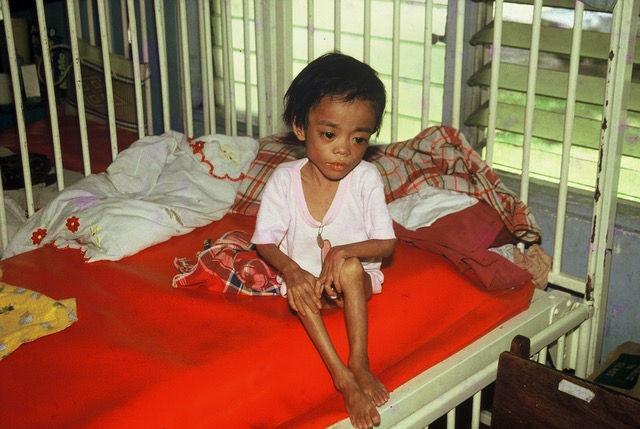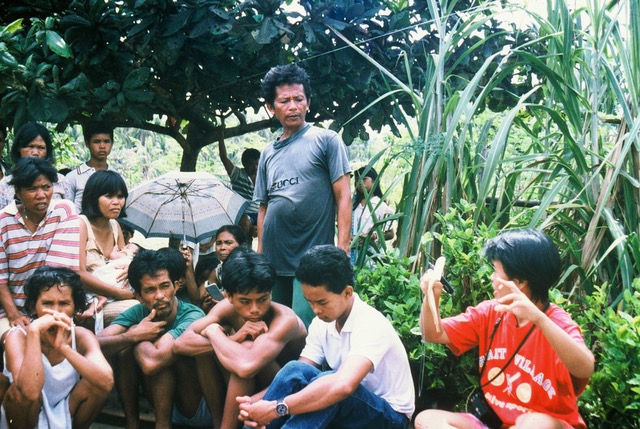
Philippine Self-Help Foundation
How We Started
The PSHF came into being in January 1987, shortly after the fall of the Marcos dictatorship. The island of Negros in the Southern Visayas region was plunged into crisis when the price of sugar on the world market collapsed. The island's sugar workers were laid off in their thousands and their children went hungry.
PSHF Founder, Richard Foster remembers walking through the paediatric wards of the provincial hospital and seeing the blank looks on the faces of third-degree malnourished children. There was one mother carrying her six year old boy; only he and his little sister had survived from a family of six children. A wall chart in the ward painted a picture of tragedy. In 1985, 600 children in that hospital alone had died from complications arising from malnutrition.
The PSHF livelihood loan programme started in that same hospital with the parents of two children receiving loans for their small businesses. An office in the city was opened six months later and a part-time co-ordinator, Elre Ciudad, appointed. The early project proposals were drafted on a manual typewriter, posted to Japan for approval and cheques for the approved loans sent back by registered mail to Elre for processing.
Every month, Elre prepared a loan repayment report for submission to Richard, who, in turn credited the repayments to the accounts of the sponsors. Three decades later, the PSHF management benefits from vastly different technology but the fundamental mission and purpose as well as the methodology of the Foundation remain the same.
Where We Operate
The PSHF operates in five provinces in the Central Visayan region - Negros Occidental, Negros Oriental, Bohol, Cebu and Guimaras.
It has city offices in Bacolod, Tagbilaran, Bulacao, and field bases in Sta.Catalina in Negros Oriental, Cauayan in Negros Occidental and Jordan in Guimaras.

NEGROS OCCIDENTAL
Negros Island, Where it all Started
It was an article in the Daily Yomiuri, an English language newspaper in Japan in the summer of 1986 that first alerted the PSHF founder Richard Foster to the famine on Negros island. His first visit to the Philippines in April 1986, just after the fall of President Marcos, had left a huge impression and a deep desire to return in a volunteer capacity.
On January, 1st 1987, Richard flew into Bacolod, the provincial capital, from Manila and stayed in the Sugarland hotel. The hotel was virtually empty of guests. The city was lifeless; there were barely any foreign visitors, other than aid workers teaming up with their local counterparts to set up feeding centres for hungry children. The island was sugar dependent and the world price of sugar had slumped.
Richard visited the Bacolod provincial hospital and saw the reality of malnutrition in the expressionless faces of the children in the paediatric ward. The idea for the PSHF started in these same wards. Richard gave 4,000 pesos to Dr. Duenas to lend to two families whose children were in the malnutrition ward. These loans were to be used for livelihood and repaid to enable these same funds to be used to help other families, through a Manila based, Negrenses' NGO run by Dr. Duenas' sister. By the end of that same year, the PSHF had its own office and a coordinator, Elre Ciudad had been appointed.
Two decades on, the Bacolod office has seen many changes in personnel and management but its mission lives on to give poor people opportunities to realise their dreams.
NEGROS ORIENTAL
A field office in Negros Oriental
After four years of working from just the one office in Bacolod city, we opened a field office in the seaside town of Santa Catalina in 1992. As with the Bacolod office, the start was very low key; PSHF trustees, John Wilson and Bernie Gampay happened to find themselves in need of shelter in a downpour and were taken to the home of the Blazo family who resided in the village of Guba. Unbeknown to them, visitors to the area were viewed with suspicion, as Santa Catalina was seen as a stronghold of sympathy for the aims of the New People's army (NPA).
Our two PSHF visitors stayed one night and left the next morning, without having attracted any undue attention from armed locals, known as "vigilantes" the lowest order of the Government's counter insurgency. The visit had however achieved its aim of locating a potential site for a field office. The village of Guba comprised fishing families as well as refugees who had fled the fighting in the hills. It was felt our livelihood loan assistance would most likely be welcomed by the local people.
A few months later, Richard accompanied Bernie for a return visit to Guba and organised a community meeting to discuss the prospects for a co-operative venture. It was clear that the will to work together was absent so it was decided to select one person, there and then, who could be trusted to be the first PSHF loan recipient in the village. Her name was Levy Balbon. Not only did she pay her loan for fishing supplies back, but she was also later to become our field coordinator. A position she retained until June 2008, when her daughter Jocelina took over.
BOHOL
The second field office.
There were a number of factors that made Bohol, an attractive location for a new office not least the ease of access from Cebu by fast ferry. The island also happens to be picturesque, with its awe inspiring chocolate hills and the presence of the world's smallest and most delightful monkey, the tarsier. Of course, the deciding factor for opening an office is whether or not our livelihood assistance programme is both needed and welcomed. Our first coordinator, Nelia Lagura took a systematic approach to this by studying various regional statistics on poverty and meeting up with selected barangay captains and Community Development Officers in various municipalities.
Nelia worked part-time from her family home in Loay, one of our first project sites. When she took on a full-time job in Cebu as a lawyer, Bernie Gampay transferred from the Bacolod office to continue the good work Nelia had started. In July, 2003, Bernie returned to Bacolod and Cecille Hernando took over. In April, 2005, we were pleased to welcome Ireen Ingles, who remains our coordinator to this day.
The Bohol office has assisted more than 1,000 families with livelihood and education loan assistance as well as medical grants since the opening of the office in 2000. During Ireen's tenure, we have implemented projects in 29 of the 48 municipalities on the island, and most recently Bien Unido in the far north of Bohol. A special emphasis of the Bohol office has been the training of farmers in organic farming and subsequent loan assistance for organic rice cultivation.
CEBU
A third office on the island of Cebu
In August, 1993, Richard arrived in Cebu to meet up with an old friend of his, Bert Bureros, a director of the Cagayan Valley Children's Home in the northern Philippines. The plan was to find a coordinator to run a new office on the island. Bert had a lead from working with World Vision a few years previously so we dropped by the office of the IVCF, a varsity Christian group, to meet up with a former colleague of his. It turned out that there was a visitor by the name of Joy Minor, staying there. She was from Davao and seeking employment in Cebu. Richard and Bert both felt there might be a fit so they invited Joy to join them for some sightseeing in the old city. After a pleasant few hours, getting to know each other, Joy was asked if she would like to start a PSHF office in the city and she agreed.
The Cebu office assisted 30 to 40 families with livelihood loans each year until 2005 at which time, some management irregularities were discovered and Joy resigned. During her tenure, we also assisted a number of individuals with medical grant assistance. In 1997, we branched out and opened a pre-school, the Lighthouse learning Center (LLC), which continues to this day, to provide good quality and affordable education to poor children in the suburb of Bulacao.
Jean Legaspi is our administrator (part-time), and Ireen Ingles, our Bohol office coordinator, runs the Cebu field office. Two students, Apple Jane Gekin and Genevive Torbiso are our part-time field workers.
Land in Guimaras
Thursday June 10th, 2010 was a significant day in the history of the PSHF. Ireen Ingles, treasurer on the PSHF board of trustees exchanged contracts with Mr Serapion Gampay for the purchase of a 2.3 hectare plot of land on the island of Guimaras in the western Visayas region of the Philippines. This piece of land, as yet unnamed, is to become a pioneering farm for the practice of permaculture and in the future, we hope, a training centre for sustainable agriculture.
Over two decades, the PSHF has been offering loan assistance to poor families for a wide variety of livelihoods. The highest proportion of loans have been for farming and in particular for rice and sugar cane cultivation. Overall, the projects have fared reasonably well with the vast majority of the loans being ultimately repaid in full. Nevertheless, we have come to realise that this does not necessarily indicate success on the part of the farmer.
Sometimes, harvests have been poor and the loan has been repaid from the sale of livestock; other times, the harvests have been satisfactory but not profitable enough to free the farmer from the debt cycle. We have also noticed that whilst we encourage organic farming practices and even offer training seminars, there is a tendency for farmers to take short cuts and not follow through on what they have learnt. This can result in a semi organic approach to farming which as a consequence does not offer the full benefits nor indeed the profitability of a totally chemical free approach.







